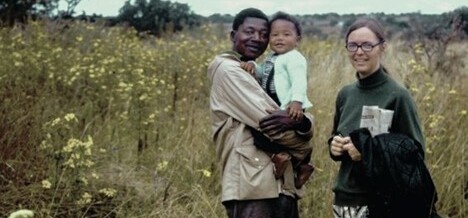
McLeod Group guest blog by John Saxby, January 27, 2025
What began as a two-year adventure turned into a lifetime commitment. In An Outsider Within, former CUSO volunteer Mary Ndlovu uses her experiences to weave together the story of her family with Zimbabweans’ struggle to end colonial rule and to create an independent country.
Mary’s prose is clear and accessible, with candour and wry humour, but few metaphors or rhetorical flourishes – if anything, it is understated. This quality makes her matter-of-fact observations all the more convincing. She provides necessary but not overwhelming detail, with references to public sources. Historians will find her book a rich resource, showing how Zimbabwe’s history felt as it was being made.
I recommend the book wholeheartedly. It should engage readers interested in Zimbabwe’s modern history or in national liberation struggles and life in postcolonial states. It will also appeal to those who – like Mary and myself – came to adulthood in the 1960s and 1970s, and worked in countries of the South under the aegis of CUSO and other civil society organizations (CSOs).
Her memoir begins in 1966, with her journey from Canada to Zambia to be a secondary-school teacher. In Zambia she met Edward Ndlovu, a senior member of ZAPU, one of the two major parties of the Zimbabwean liberation movement. They fell in love, married and had two daughters there. In April 1980, they moved to Zimbabwe to celebrate its independence, and later that year, the birth of their son. With Bulawayo as her home, Mary lived and worked in Zimbabwe for the next 36 years. Her memoir concludes with her return to Canada in 2016.
The wide-ranging content of An Outsider Within is organized by the interplay among politics, family, and work and the broader society. Politics predominates: the political is profoundly personal, shaping family, work and civil society. With touching candour, Mary shares with readers the full range of human emotions: joy, love, deep sadness and grief; professional satisfaction and frustration; anger, fear and horror at the abuse of power by the leaders and agents of the state; and, remarkably, only rarely despair. Yet, she perseveres, sustained by her extraordinary reserves of hope, courage and resilience.
There are multiple extended and overlapping stories in Mary’s memoir. She explores them in a series of short chapters. They include her years within the education systems of Zambia and Zimbabwe; her life with Edward, creating a family embracing different cultures, and enduring deep personal loss; the politics of the liberation struggle and independent Zimbabwe, the latter marked by brutal state violence and blighted hope for democracy; the extended economic crises of Zimbabwe and the scourge of AIDS; her work within civil society organizations and movements; and her work as a researcher, historian and consultant with Zimbabwean CSOs.
Not long after Edward’s death in 1989, a relative suggested a memorial in his name – he had been a national figure, respected especially in Matabeleland, and deserved to be honoured and remembered. Mary is typically modest about what happened next: “Clearly, they expected me to take the initiative… [I wanted] something which could have an impact on a wider community. Somehow the idea of a library popped into my head.” In 1990, the Edward Ndlovu Memorial Trust was launched. Its first project was a community library in Gwanda, the provincial capital of Matabeleland South. Its trustees secured funding from diverse donors, and built a firm financial foundation. In the ensuing decades, the Edward Ndlovu Memorial Library has established libraries in 75 rural schools. There is now a registered Canadian charity, Edward Ndlovu Community Libraries. Its website is full of photos and descriptions of its work. A reader can help fund an inspiring story.
John Saxby lived, worked and studied in central/southern Africa for 15 years, from 1969 to 2014. During the 1980s, he was a program director for CUSO in Zambia and Zimbabwe, where he and Mary Ndlovu became friends. Image: From the book cover.
